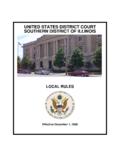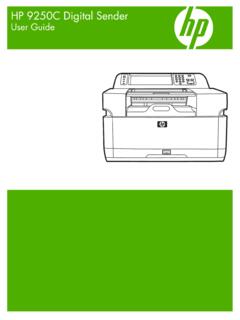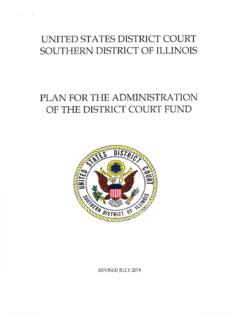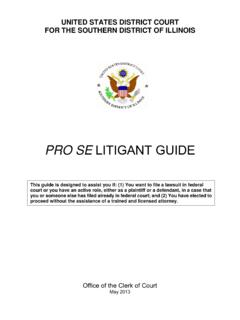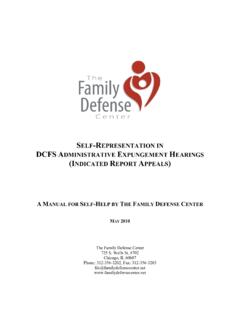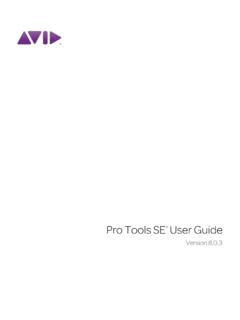Transcription of PRO SE LITIGANT GUIDE - :: U.S. District Court
1 UNITED STATES District Court FOR THE SOUTHERN District OF ILLINOIS pro se LITIGANT GUIDE Office of the Clerk of Court May 2013 This GUIDE is designed to assist you if: (1) You want to file a lawsuit in federal Court or you have an active role, either as a plaintiff or a defendant, in a case that you or someone else has filed already in federal Court ; and (2) You have elected to proceed without the assistance of a trained and licensed attorney. TABLE OF CONTENTS I. GENERAL INFORMATION.. 1 A. BASIC DEFINITIONS.. 1 B. HOW THIS GUIDE CAN HELP.. 1 C. THE RISKS INVOLVED IN REPRESENTING YOURSELF.. 1 II. IMPORTANT ISSUES.. 2 A. IS THIS Court THE APPROPRIATE Court TO HEAR YOUR DISPUTE? .. 2 B. IF THE CASE CAN BE FILED IN FEDERAL Court , IS IT THE TYPE OF CASE IN WHICH LITIGANTS TYPICALLY REPRESENT THEMSELVES?
2 2 C. IS THERE AN ALTERNATIVE TO REPRESENTING YOURSELF THAT IS AFFORDABLE? .. 3 D. WHAT IF YOU CANNOT FIND AN ATTORNEY TO TAKE YOUR CASE? .. 3 E. WHAT Court FEES AND COSTS ARE YOU REQUIRED TO PAY?.. 4 F. WHAT IF YOU CANNOT AFFORD TO PAY THE FEES? .. 4 G. WHERE CAN YOU FIND THIS Court S RULES OF PROCEDURE AND APPLICABLE FEDERAL LAWS IF PROCEEDING pro se ? .. 5 III. HOW DO YOU START A NEW CIVIL CASE? .. 6 A. FILE A COMPLAINT.. 6 B. SERVE THE COMPLAINT.. 6 IV. WHAT HAPPENS NEXT? .. 8 V. HOW DO YOU SUBMIT DOCUMENTS TO THE Court ? .. 9 VI. HOW DO YOU OBTAIN INFORMATION ABOUT THE STATUS AND PROGRESS OF YOUR CASE? .. 10 VII. IS IT POSSIBLE TO SPEAK DIRECTLY TO A JUDGE OR MEMBER OF HIS STAFF ABOUT YOUR CASE? .. 10 VIII. WHAT HAPPENS IF YOUR CASE IS DISMISSED?
3 10 APPENDIX OF FORMS .. 11 District Court Southern District of Illinois pro se LITIGANT GUIDE (Revised May 2013) Page 1 I. GENERAL INFORMATION. A. BASIC DEFINITIONS. The plaintiff and defendant in a Court case generally are referred to as the parties or litigants. The plaintiff asserts a claim or right protected by law against the defendant; the defendant denies the claim or right. Then the Court determines whether the asserted claim or right has merit. The great majority of litigants who appear in this Court are represented by an attorney who has been trained in the law and is familiar with Court rules and procedures. Parties who are not represented by licensed attorneys (who elect to represent themselves) are referred to as pro se litigants ( pro se plaintiff or pro se defendant).
4 The term pro se is simply a Latin phrase that means for yourself. B. HOW THIS GUIDE CAN HELP. This GUIDE will not answer all questions about what you need to do to represent yourself effectively as a pro se LITIGANT . It outlines the basic steps that are required to file an action (also known as a lawsuit) in this District Court . It also provides some general guidance on the next steps in the process once you have filed an action. C. THE RISKS INVOLVED IN REPRESENTING YOURSELF. Self -representation carries certain responsibilities and risks that a pro se LITIGANT should know before proceeding. The Court encourages all individuals who are thinking about self-representation to carefully review the risks associated with self-representation and to be aware of the potential consequences.
5 Rule 11 of the Federal Rules of Civil Procedure prohibits the filing of lawsuits that are clearly frivolous or filed merely to harass someone. If, after reviewing your complaint, a judge determines that you have filed a lawsuit for an improper or clearly unnecessary purpose, the judge may impose sanctions against you, including ordering you to pay a fine to the Court or to pay the legal fees of the person or persons against whom you filed the lawsuit. You are responsible for learning and following the procedures that govern the Court process. Although the staff of the clerk s office can provide general information concerning Court rules and procedures, staff is forbidden as a matter of law from providing legal advice, from interpreting and applying Court rules, or otherwise participating, directly or indirectly, in any action.
6 District Court Southern District of Illinois pro se LITIGANT GUIDE (Revised May 2013) Page 2 II. IMPORTANT ISSUES. You should consider these important issues before you decide to represent yourself in an action before this District Court : A. IS THIS Court THE APPROPRIATE Court TO HEAR YOUR DISPUTE? Federal courts can only decide limited kinds of cases. The United States District Court for the Southern District of Illinois is one of 94 trial courts in the federal Court system. A federal trial Court is authorized to hear disputes that fall into the following four categories only: Those that deal with a question involving the United States Constitution; Those that involve questions of federal law, as opposed to state law; Those that involve the United States of America as a party, whether as plaintiff or defendant; and Those that involve a dispute among citizens of different states when the amount in controversy exceeds $75, , exclusive of interest and costs.
7 (Note: A person is a citizen of the state where he or she is physically present with an intent to remain there indefinitely.) B. IF THE CASE CAN BE FILED IN FEDERAL Court , IS IT THE TYPE OF CASE IN WHICH LITIGANTS TYPICALLY REPRESENT THEMSELVES? A LITIGANT may appear pro se in any case that is properly within the jurisdiction of this Court . There are five categories of cases that are most often filed by pro se litigants: Cases alleging denial of civil rights under Title 42, United States Code, Section 1983, that are not filed by prisoners; Cases alleging denial of civil rights under Title 42, United States Code, Section 1983, filed by persons who are in jail or prison and who challenge their sentences or conditions of confinement; If your complaint does not fall under any of these categories, you should not file it in federal Court .
8 Instead, you should contact the Circuit Court in the county in which you live. District Court Southern District of Illinois pro se LITIGANT GUIDE (Revised May 2013) Page 3 Cases alleging a tort claim which is an injury to an individual (note that tort claims brought in federal Court are subject to strict jurisdictional requirements); Cases alleging employment discrimination under Title 42, United States Code, Section 2000(e); and Cases seeking judicial review of a decision by the Commissioner of Social Security. C. IS THERE AN ALTERNATIVE TO REPRESENTING YOURSELF THAT IS AFFORDABLE? Most people who file and pursue litigation in federal Court employ a licensed, practicing attorney who has appeared in Court and is familiar with the rules of procedure that govern the Court process.
9 If you would prefer to have an attorney represent you but you are unable to afford one, you should consider contacting one of the following Illinois Lawyer Finder: (217) 525-5297 or toll free (800) 922-8757 Land of Lincoln Legal Assistance: (618) 394-7300 or toll free (877) 342-7891 These agencies can explain the various options for obtaining and paying for legal services. D. WHAT IF YOU CANNOT FIND AN ATTORNEY TO TAKE YOUR CASE? If you cannot find an attorney to represent you, you have the right to file an action on your own. Remember, however, that as a pro se LITIGANT , you are representing only yourself and presenting only your claims or defenses. Under the law, you cannot speak for another person, a company, or an entity (such as a club or association that includes other individuals).
10 When you appear pro se , you must follow the same rules and procedures that licensed attorneys who practice in this Court must follow. Generally, judges hold pro se litigants to the same standards of professional responsibility as trained attorneys. pro se litigants may also ask the Court to recruit an attorney (also called counsel ) for them in a civil case. pro se litigants have no right to be represented by counsel in a civil case , and the Court has no obligation to appoint counsel in a civil case. All this Court can do is try to find a lawyer to volunteer to assist a pro se LITIGANT . The Court will attempt to recruit counsel in a few select cases where having an attorney seems appropriate or important. You must first show that you have tried to find counsel to represent you but District Court Southern District of Illinois pro se LITIGANT GUIDE (Revised May 2013) Page 4 have been unsuccessful (and provide proof of your efforts).
